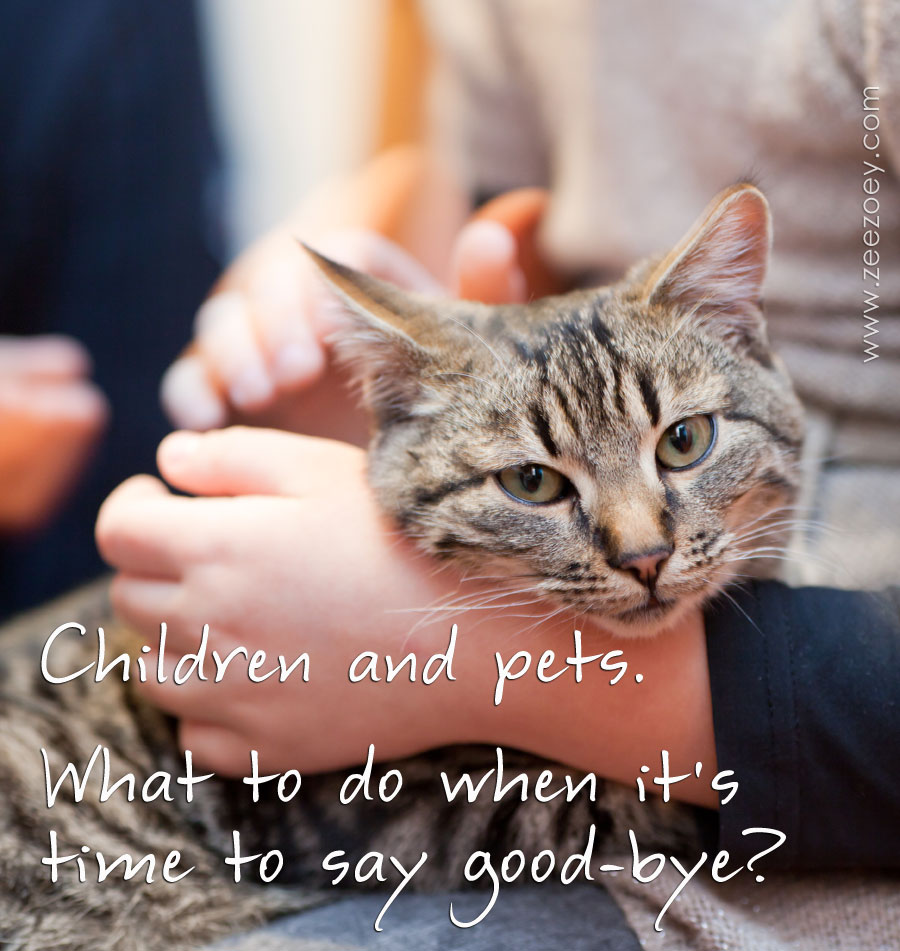Cat Loss and Children – How to Help Them Cope with the Pain and Grief
Editor’s Note: I realize this post is a heavy subject and probably not one you were expecting, but with the holidays heading our way, I felt the timing was appropriate. Holidays are a time that can cause a lot of stress and anxiety for us – especially for those of us that might be remembering a passed cat who we dearly miss, or those of us that are going through personal issues with a cat who is currently ill, or possibly even nearing end-of-life. In the blogging world, we often think of everything in adult terms, often forgetting that there are others around us who are also stressed and anxious. This post is for those who have children in their lives that might need some guidance with the subject of pet loss and grief. The focus of the article is on cats, but the advice applies to any beloved pet, regardless of the species.
As someone who is involved in the cat world nearly 24/7/365 via blogging, social media, and other outlets, very rarely does a day go by that I do not hear about one cat or another who has passed on. Online sites have become a therapeutic outlet for those who chose to share their grief publicly – I try not to let it get to me, but sometimes it is overwhelming because I take the circumstances to heart, grieving through association.
I am someone who is all too familiar with grief – I’ve had to say goodbye to countless cats in my lifetime and I even wrote a book specifically about the subject (Purr Prints of the Heart – A Cat’s Tale of Life, Death, and Beyond). However, that said, it is still difficult for me, and it got me to thinking about children. For some cats who have passed on, they were part of a household with children, perhaps even being the child’s first experience with death. Online sites are not an option for them, so how do they cope with the death? While it might seem kinder to shield them from the pain by glossing over kitty’s death, in actuality, by including a child at an early age in the end-of-life process, not only will it help them to cope with other inevitable losses throughout life, it will teach them invaluable lessons about empathy and compassionately caring for others.
How much involvement depends on the child’s age, maturity, and life experiences, along with the circumstances surrounding the cat. If the cat has been ill for some time or is elderly and nearing end-of-life, a discussion with the child should take place to explain what to expect during the different stages of the cat’s end-of-life. Convey that kitty has feelings and needs, just like people do, and that special care will need to be taken to insure kitty lives her remaining days as loved and comfortable as possible.
For example, she might lose weight, have difficulty walking, become incontinent, have special dietary or medical needs, or even begin to find hiding spaces away from the family and the child needs to understand it is a normal part of the end-of-life process. Assign certain responsibilities to the child, such as keeping kitty’s dish full of fresh water so the child feels personally vested in the care of their pet. Encourage the child to interact with the cat by talking about how happy the cat made them feel and what they will miss about their time together. Cats understand the loving tone of a voice and it is important for a child to have a chance to say goodbye to their furry friend.

When Jazz was nearing the end of his life, he was a shell of himself and practically skin and bones. For a child, without understanding what is going on, it could be particularly confusing and upsetting.
Sometimes euthanasia will be necessary to ease the suffering of a cat – if so, discuss it with the child based on age-appropriateness. Managing how the pet dies can be comforting – some children might want to be with their pet during the final moments, and for others, it will be too difficult to handle. It is important to relay kitty will no longer be in pain and helping to let him or her go is a humane act.
If the cat’s death was sudden or unexpected it will undoubtedly raise many questions and fears in the child. Share details based on their age and the specific questions they ask. Even in situations like this, it is important to implement quality time to honor the beloved pet.
Hold a funeral or ceremony to bury the cat. Let the child help find a special spot in the yard and have them write a poem or love letter, draw a picture, or pick out something of meaning, such as a collar, bedding, or a favorite toy to bury with the cat. Maybe read a prayer during the ceremony and have attendees share special memories about the cat. It might also be helpful to consider having the child think of a special sentiment to have engraved on a garden stone or headstone plaque.
Projects are therapeutic too, such as making a special scrapbook of pictures and artwork. Plant a tree in memory of the cat or a special flower bush. Decorate the urn of a cremated cat and have a plaster cast of the cat’s paw print made in tribute. All of these activities and more provide a healthy outlet for the child to express their feelings.

In our house, we have a special area where we pay loving tribute to those we have loved and lost. Having something like this for a child can help provide comfort and closure.
For younger children who might not understand what happened to their pet, read them an age-appropriate children’s book about end-of-life to encourage conversation. Children at this age can feel responsible for the pet’s death and it is important to let them talk about their feelings. Honesty is important – pretending the cat “went to sleep” can leave a child feeling confused or frightened – kids can be very literal and develop misconceptions about people (and other pets) going to sleep and not waking up.
Most importantly, regardless of age, let the child see the people around them grieve, as they are missing the cat, too. Children learn from the behaviors of others and it is important for them to understand it is a natural, normal process to feel sad or upset. Keep the channels of communication open, be patient, give lots of love and hugs, go for walks with the child, share happy memories of the pet, and keep active. Encourage the child to remember their cat and let them know while the pet is gone in the physical sense, the happy memories of the pet will always remain in their heart.
It’s not always easy and it can be a long road to recovery, but by involving children in the end-of-life process, the vast majority of them will adjust in a normal, healthy way to the loss of the pet and will be all the more compassionate and emphatic toward others as a result of it. If the decision is made to adopt again, include the child in the process. Go to a shelter and let them help pick out a cat. Perhaps they could suggest names and help get the house ready by picking out special toys, bedding, and more.

If the timing is right, bringing a child to a shelter to help pick out a new family member can be therapeutic and enriching.
It is also important to stress that the new furry family member is not a replacement for the cat that died. Sometimes bringing a new pet into the household can raise feelings of guilt, and to help alleviate those feelings, it is important to help the child understand that by adopting a new cat, they are saving a life, with an opportunity to create new and different memories.
If anyone has any comments, advice, or suggestions to help a child cope with loss, please feel free to share – it would be greatly appreciated.

























Sometimes adults are so focused on how to explain things … that they forget the most important parts … listening and providing an example for grieving. Parents want so badly to shield their children from pain – that sometimes they go too far in the other direction – confusing their children instead.
That’s true, mommakatandherbearcat. And often adults are so focused on their own grieving, that they don’t realize it’s affecting the children, too.
Wow, well said, Momma Kat!!
Sometimes the loss of a pet is a child’s first loss and introduction to grief and healing. It’s especially important we do this right for them.
I completely agree, Bernadette. I remember once being told a pet bunny of mine had run away. When I found out the truth years later, it really crushed me.
Thanks for sharing all of this great advice, Deb! It’s hard to know what will help when kids come to school carrying grief related to a pet’s sickness or death. Thank you for sharing this great advice!
Crystal – yes, as a grade school teacher, this is especially important information for you.Parents or caretakers should inform the teacher if the child has lost a pet so that the teacher can react and help appropriately. Thank you for bringing this up – it’s good advice for anyone with a child in school.
This is an important topic albeit a hard one. One of the Vets at the practice where we take Cody and Dakota wrote an amazing book for children (and it will help adults too). I reviewed it on Dakota’s blog last summer, you might want to check it out. http://dakotasden.net/2016/07/11/pet-loss-and-children-being-brave-for-bailey-by-corey-gut-dvm-beingbraveforbailey-baileybook/
Thank you for sharing that, Caren. I will check it out – it will be good to have on hand in my mind if anyone asks for a resource.
Excellent post. I love the children’s book by Judith Viorst called The Tenth Good Thing About Barney. I didn’t discover it until a few years ago when my beloved cat Barney died.I highly recommend it for grieving kids.
Excellent post filled with thoughtful suggestions — thank you so much for this. Having been born into a home “with cat” and growing up with him until he left us at age 18, I fortunately did not have to deal with him leaving us when I was small. My grandfather was the first one I had to say goodbye to, when I was 6. Fortunately, my family was close, loving, and realistic in dealing with these matters, and so they were not scary or too traumatic for me, simply a part of the “Circle of Life”.
I especially thank you for your mention of possibly adopting another cat, never to “replace” a cherished family member who has passed, but to offer the love, safety, comfort and good life to another sweet and deserving cat in need. This has always been our policy, and I believe it not only saves deserving lives, it also helps in the healing process for those left behind after a loss.
What a wonderful post ! A pet loss such an important step in a kid’s life. You give really great advice ! Purrs
These are good tips. It is difficult for younger children to understand death, so it can be a challenge to explain it to them in a way that makes sense.